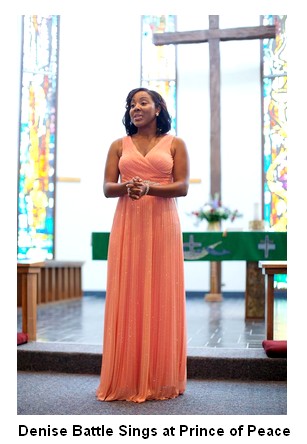
|
Where Go the Boats? Anna Sterrett and Oksana Lutsyshyn |
Reviews Lyric Soprano Denise Battle & Pianist Oksana Lutsyshyn A locally grown and developed recitalist, Denise Nicole Battle, is a beautiful young woman with a beautiful, powerful voice. A native of Portsmouth, Virginia and a recent graduate of Norfolk State University, Ms. Battle has been singing since age four in church and then in choirs: the NSU Concert Choir, Spartan Chorale - directed by Dr. Carl W. Haywood (2006-2008) and the I. Sherman Greene Chorale - directed by Mr. Terry Butler (2009-2011). Realizing that she wanted to perform art song, Ms. Battle has studied for the last three years with Karen Hoy, a local expert in the genre. We first heard Ms. Battle three years ago singing solo art songs at a Karen Hoy Studio recital with several other singers. Ms. Battle impressed us then as a singer to watch and this recital was a confirmation of her developing abilities. Her opening song, by G.F. Handel from his opera Giulio Cesare, was V'adoro pupille (I adore you, eyes) with a glorious, big sound that expanded with clarity and ever more power. It was an emotional epiphany for this listener. Amarille, mia bella by Giulio Caccini (1551-1618), written for the Medici family, helped develop the genera of opera when the Renaissance was giving way to the early Baroque style. Love is the subject of this song that flows with winning beauty. Each repetition of the beloved's name displays a new ornamentation. It is one of the great, early art songs. The German set began with Dein Blaues Auge (Your blue eyes) and continued with Der tod, das ist die ku'hle nacht (Death is the cool night). Both settings were by Johannes Brahms (1833-1897). Wearing an apricot, floor-length, spangled dress with a shaped bodice and a full skirt that fell with pleats, Ms. Battle gently moved her hands as if she were a potter shaping the sound to perfection. There is a sense of mystery in singing of death as a cool night contrasted by the energy of the line about sultry day. At the end the singer longs for rest.
The aria Ach, ich fuhl's (I feel it), from Mozart's The Magic Flute ended the first half. Pamina laments a budding love that seems to have faded. As a test of his obedience, Tamino is under orders not to speak. Misinterpreting his silence as rejection, she is so despondent that she wishes for death. After intermission Ms. Battle's vocal teacher, Karen Hoy, spoke of the years of preparation and the need for performance opportunities for young singers to hone their skills. Ms. Hoy has organized the Cantabile Series which will sponsor its first recital and master class this fall, offering a platform for developing talent on stage. After a French tune played by Ms. Lutsyshyn, Ms. Battle, wearing a blue gown, reappeared and asked the audience to applaud only at the end of each set, rather than after each song. Three songs by Gabriel Fauré (1845-1924), sung in French, followed. Notre amour (Our love) is the French way of conveying the same sentiment of the last Brahms song. Our love is something light, enchanting, sacred, infinite and eternal, all swiftly told. The quiet intensity and word painting of En Sourdine (Muted) speaks also of love set in natural surroundings. The desire to continue this sweet moment is poignant. The third selection was Après un rève (After a dream). Asleep the lover is spellbound by happiness until he awakes, only to go back to sleep to return to the splendor of love that he found only there. In Ms. Battle's voice the words have such meaning. The songs of local composer Adolphus Hailstork (b.1941) are not as nationally known as his choral and orchestral works. We are thankful that local singers bring them to our attention. From his set of Three Simple Songs we heard two songs. Not in Vain (text Emily Dickinson) is a clear, unsentimental statement of a useful life of caring for those problems that come our way. Daffodils (text William Wordsworth) is a meditation on the joys of life focused on a single experience of thousands of daffodils seen beside a lake. In reverie the poet recalls and writes of the scene and his heart dances once again with rapture. In the line "You can tell the love of Jesus and say 'He died for all" the high soprano phrase seemed new in Harry T. Burleigh's (1866-1949) Balm in Gilead. The flute-like sound of the voice in "heal the sin-sick soul" was lovely. Turning to the opera Turandot by Giacomo Puccini (1858-1924) we heard Liu's love for Calaf expressed in Signore, ascolta (Sir, listen!) as her heart breaks because he loves only Turandot. Her last selection was from Gian Carlo Menotti's (1911-2007) The Old Maid and the Thief. The song Steal Me, Sweet Thief is sung by an old maid who rues her forty years of spinsterhood. The song is filled with longing. A drifter is taken in by her kindhearted maid and the lady of the house desires that he make a pass at her: “steal my lips before they crumble to dust…” bringing to an end this full recital with such amazing singing and playing. The fifty listeners were told by Ms. Hoy that Denise Battle had been given a full-tuition scholarship and a paid teaching assistanceship at West Virginia University to pursue her master's degree in vocal performance this fall. We hope she comes often to sing for us at home as she grows in skill and repertory at WVU.
Opening with seldom-heard songs by English composer Roger Quilter (1877-1953), we first heard Where Go the Boats?, No. 3, Op. 5, written for his sister and Three Songs of the Sea, his Opus 1, written for his mother. The Sea Bird was lovely, written to give the singing voice the chance to soar like the birds do. In Moonlight the piano creates a current of sound carrying the soft, silver tones of the voice. In By the Sea, with excitement in the voice, the artists created the dazzle of the mystical light of the sea. Three songs by Franz Schubert (1797-1828) offered brief, lyrical exclamations of great beauty. The first two songs are from Schubert’s final cycle, Schwanegesang, composed shortly before his early death at age 31. Das Fischermädchen (The Fisher Maiden), usually performed by baritone voices, is a love song that speaks of his heart as very like the sea, with its storms and ebb and flow; many pearls in the depths below. In the soprano voice the song was equally lovely. Also, Am Meer (By the Sea), sung by soprano, is a first for this listener. The singer paints a picture of evening light at a far distance over the sea. The couple sits quietly; she weeps, he drinks fully the tears of passion and is consumed by them. The pianist maintains the sound of water in motion throughout. Finally, Auf dem Wasser Zu Singen (To be sung on the water) speaks of harmony with the ebb and flow of life and an acceptance of one’s own mortality in the world of time. It was a superb performance. Written five years before the first two selections, it was sung by sopranos, mezzos or tenors. Three French selections by Gabriel Fauré (1845-1924) captured French melodie in feeling and sound. Au bord du l’eau (At the water’s edge) reminds me of Poulenc’s Hôtel, a song of languidly smoking in the sun on vacation, written 65 years after this one. Fauré’s song speaks of smoke from a chimney on the horizon; the insouciant feeling is the same but here he dreams of love that never wearies. In Les Berceaux (The Cradles) the words tie the rocking of the boats to that of cradles rocked by women while the men dare the horizon in these boats. This theme of a brief but potent exploration of freedom versus security continues in Vaisseaux (Ships) where tall ships offer enticing adventure though the closing line says “I long for foreign shores I’ll never dare.” Sterrett and Lutsyshyn created superbly French performances. The second half offered a variety of interesting repertory. Ariel’s Vocalise from The Tempest by Lee Hoiby (1926-2011) is an incredible showpiece for the soloist with supporting piano. From piercing high notes to crushingly, deep tones, the bird-like exclamations require precision. The clarity of the voice was breathtaking and the piano coda landed us gently back on earth. Next came Stokes Bay, a setting for dramatic coloratura by James Lego from his Two Songs of the Sea, Op. 28. It is a hysterical, grief-filled farewell to her true love whom she will see no more, as he sails away. The composer graduated from the University of North Carolina, Greensboro in 2011. Gently, Little Boat from The Rake’s Progress by Igor Stravinsky (1882-1971) has a childlike energy, an accelerating piano after each verse and is untouched by grief or fear. Next we heard Neapolitan Songs arranged by A. Fassio. O Marienariello (Sailor’s Love Song) is about a sailor who dies after making love by the sea but you know his resurrection will come soon. Marechiare (a place name) speaks of love in moonlight seen over an open balcony window while carnations perfume the night air. This is not a refined being-in-love but is heartfelt and written with a fine vocalise. Pianist and vocalist are equal partners. In Ciribiribin (a woman’s name) the moon and the Chamberlain both spy on the lovers, but who cares, for the dark-haired rascal adores her lovely face, beautiful, little nose, beautiful smile and lips. The encore, Summertime, just as Gershwin wrote it, was the perfect ending. My one criticism: the program booklet picture does not well represent the maturing beauty of Ms. Sterrett. Back to Top
|
 The last in the Italian language set, Vittoria, mio core! (Victorious, my heart) by Giacomo Carissimi (1605-1674) is a song about moving beyond the fire of passion and its cruel torments. The voice that opened-up fully in the final phrase was stunning.
The last in the Italian language set, Vittoria, mio core! (Victorious, my heart) by Giacomo Carissimi (1605-1674) is a song about moving beyond the fire of passion and its cruel torments. The voice that opened-up fully in the final phrase was stunning. Next we heard the lullaby Venetianisches Wiegenlied by Austrian composer Joseph Marx (1882-1964). The bell-like tones in the piano remind us how essential Ms. Lutsyshyn is in shaping the experience of each song. The journey of a lifetime is captured in this three-minute song. The set concluded with Brahms' Von ewiger Liebe (Of Eternal Love); a grand title, for sure, but Brahms delivers and so did our performers. A young man is seeing his beloved home in the dark of night - no birdsong, no lights. They chat on with abandon until he offers her a way out if she suffers disgrace from being with him, setting off a vocal tour-de-force as she refuses: “Iron and steel are firm but can be recast but our love will last forever!” The vocal strength builds line-by-line. By the end it is an amazing display of beautiful power by both artists.
Next we heard the lullaby Venetianisches Wiegenlied by Austrian composer Joseph Marx (1882-1964). The bell-like tones in the piano remind us how essential Ms. Lutsyshyn is in shaping the experience of each song. The journey of a lifetime is captured in this three-minute song. The set concluded with Brahms' Von ewiger Liebe (Of Eternal Love); a grand title, for sure, but Brahms delivers and so did our performers. A young man is seeing his beloved home in the dark of night - no birdsong, no lights. They chat on with abandon until he offers her a way out if she suffers disgrace from being with him, setting off a vocal tour-de-force as she refuses: “Iron and steel are firm but can be recast but our love will last forever!” The vocal strength builds line-by-line. By the end it is an amazing display of beautiful power by both artists. An audience of more than 50 listeners gathered at 3 pm on a Sunday afternoon to enjoy the pleasures of an art song recital. The lovely, dark-haired soprano Anna Sterrett, with the remarkably talented and versatile, trim, blond pianist Oksana Lutsyshyn, joined forces in a shimmering performance.
An audience of more than 50 listeners gathered at 3 pm on a Sunday afternoon to enjoy the pleasures of an art song recital. The lovely, dark-haired soprano Anna Sterrett, with the remarkably talented and versatile, trim, blond pianist Oksana Lutsyshyn, joined forces in a shimmering performance.